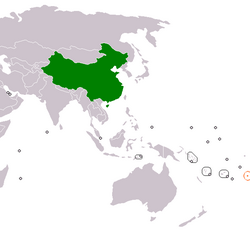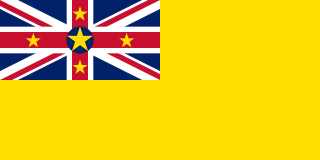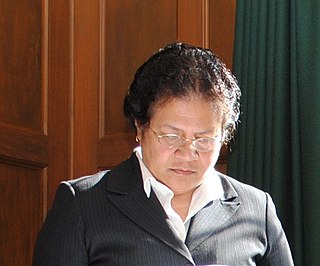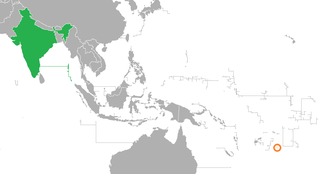 | |
China | Niue |
|---|---|
China-Niuean relations are relations between China and Niue.
 | |
China | Niue |
|---|---|
China-Niuean relations are relations between China and Niue.
Niue has been self-governing in free association with New Zealand since 3 September 1974 when the people endorsed the Constitution in a plebiscite. [1] Niue is fully responsible for its internal affairs. Niue's position concerning its external relations is less clear cut. Section 6 of the Niue Constitution Act provides that:
Nothing in this Act or in the Constitution shall affect the responsibilities of Her Majesty the Queen in right of New Zealand for the external affairs and defence of Niue. [2]
Section 8 elaborates as follows:
Effect shall be given to the provisions of sections 6 and 7 [concerning external affairs and defence and economic and administrative assistance respectively] of this Act, and to any other aspect of the relationship between New Zealand and Niue which may from time to time call for positive co-operation between New Zealand and Niue after consultation between the Prime Minister of New Zealand and the Premier of Niue, and in accordance with the policies of their respective Governments; and, if it appears desirable that any provision be made in the law of Niue to carry out these policies, that provision may be made in the manner prescribed in the Constitution, but not otherwise. [3]
The establishment of diplomatic relations between Niue and China followed a number of discussions between the two sides. In 2004, Chinese Premier Wen Jiabao sent a telegram to Niue PM Young Vivian to convey his sympathy on Niue suffering windstorm. [4] In April, 2006, Premier Wen met with PM Young Vivian during the conference of “China-Pacific Island Countries Economic Development & Cooperation Forum” held in Fiji. [4] Niuean Prime Minister Young Vivian and the Chinese Foreign Minister, Li Zhaoxing, held discussions in Wellington in on 1 August 2006. [5] In June 2007, Niue PM Young Vivian visited China. [4]
Niue established diplomatic relations with the People's Republic of China on December 12, 2007. [6] Notwithstanding Niue's constitutional position, the New Zealand government is clear that it does have the capacity and right to establish diplomatic relations with any country, the New Zealand government website stating that:
For all practical purposes Niue conducts its own external relations, including establishing formal diplomatic relations with other states. [7]
Traditionally, Niue's foreign relations and defence have been regarded as the responsibility of New Zealand, which has full diplomatic relations with China. Importantly, it is a requirement of Niue's constitution that in such matters," consultation between the Prime Minister of New Zealand and the Premier of Niue" must take place and it is not clear that such consultation did, in fact, take place before Niue purported to establish diplomatic relations with China. As such, Niue's authorities may have acted outside the powers conferred on them under Niue's constitution.
Another notable matter is that the Joint Communique signed by Niue and China is different in its treatment of the Taiwan question from that agreed by New Zealand and China. New Zealand "acknowledged" China's position on Taiwan but has never expressly agreed with it, but Niue "recognizes that there is only one China in the world, the Government of the People's Republic of China is the sole legal government representing the whole of China and Taiwan is an inalienable part of the territory of China." [6] Critics have asked whether Niueans can continue to benefit from free association with New Zealand and yet disregard New Zealand's advice and establish an independent foreign policy. [8]
On 18 October 2008, Zhang Limin, China's first ambassador to Niue, presented his credentials to Niue Prime Minister Toke Talagi in the capital of Alofi. [9] His credentials were accepted by the Niuean Premier. Mr. Zhang is also China's ambassador to New Zealand where he is based.
In July 2009, Talagi stated that, if development aid were not forthcoming from New Zealand, he would request aid from China instead. [10]
China's opening of diplomatic relations with Niue may be seen within the wider context of China's relations with the Pacific region. Every independent country in Oceania currently maintains diplomatic and economic relations either with the People's Republic of China or with the Republic of China (Taiwan).

Niue is a self-governing island country in free association with New Zealand. It is situated in the South Pacific Ocean and is part of Polynesia, and predominantly inhabited by Polynesians. One of the world's largest coral islands, Niue is commonly referred to as "The Rock", which comes from the traditional name "Rock of Polynesia".
The history of Niue is the history of the area and people of Niue, including its indigenous Polynesian societies. Niue was first settled by Polynesian sailors from Samoa in around 900 AD. Further settlers arrived from Tonga in the 16th century.

The politics of Niue take place in a framework of a parliamentary representative democratic dependency, whereby the Chief Minister is the head of government, and of a non-partisan system. Niue is self-governing in free association with New Zealand and is fully responsible for internal affairs. New Zealand retains some responsibility for external affairs, in consultation with Niue. The Niue Constitution Act 1974 (NZ) vests executive authority in His Majesty the King in Right of New Zealand and the Governor-General of New Zealand. The constitution specifies that in everyday practice, it is exercised by a Cabinet of the Premier of Niue and three other ministers. The premier and ministers must be members of the Niue Assembly, the nation's legislative assembly. The Judiciary is independent of the executive and the legislature.

China, officially the People's Republic of China (PRC), has full diplomatic relations with 180 out of the other 192 United Nations member states, Cook Islands, Niue and the State of Palestine. As of 2024, China has had the most diplomatic missions of any state.

The foreign policy of Solomon Islands as of 2008 was described by the Solomon Islands government as a "look north" policy, aimed as strengthening diplomatic and economic relations with Asian countries for development purposes.

Mititaiagimene Young Vivian is a Niuean politician and diplomat, who served as Premier of Niue twice, the first time from December 1992 to March 1993 following the death of Sir Robert Rex, and the second from 2002 to 2008. He also served as a Cabinet Minister multiple times, first as Minister of Education, Economic Development and Agriculture and later as Minister of Finance under Robert Rex, and in the Cabinet of Sani Lakatani. From 1979 to 1982 he served as Secretary-General of the South Pacific Commission.

The Joint Communique of the Government of Japan and the Government of the People's Republic of China was signed on September 29, 1972, in Beijing. The communique established and normalized diplomatic relations between Japan and the People's Republic of China (PRC), resulted in the severing of official relations between Japan and the Republic of China (ROC) in Taiwan. The document produced nine articles in a joint statement, showing compromises on previously ambiguous principles enunciated by both sides. Of these, four points are particularly worthy of attention:
The Cook Islands maintains diplomatic relations with various countries and is a member of multilateral organisations. While the country is in free association with New Zealand, which can act on the Cook Islands' "delegated authority [...] to assist the Cooks Islands" in foreign affairs, the Cook Islands nevertheless enters into treaty obligations and otherwise "interacts with the international community as a sovereign and independent state."
Niue maintains diplomatic relations with various other countries and multilateral organizations. Since 1974, Niue has been a self-governing state in free association with New Zealand. The King in right of New Zealand is the head of state of Niue, making Niue part of the Realm of New Zealand.

General elections were held in Niue on 7 June, 2008. They were initially expected to be held in April, but were delayed until June 2008. Niue has a 20-member legislative assembly, called the Niue Assembly, whose members are elected by approximately 600 registered voters. The assembly consists of 20 total members, 6 elected on a common roll and 14 representatives of the villages

Oceania is, to the People's Republic of China and the Republic of China, a stage for continuous diplomatic competition. The PRC dictates that no state can have diplomatic relations with both the PRC and the ROC. As of 2024, eleven states in Oceania have diplomatic relations with the PRC, and three have diplomatic relations with the ROC. These numbers fluctuate as Pacific Island nations re-evaluate their foreign policies, and occasionally shift diplomatic recognition between Beijing and Taipei. The issue of which "Chinese" government to recognize has become a central theme in the elections of numerous Pacific island nations, and has led to several votes of no-confidence.

Tauveve O’Love Jacobsen is a Niuean politician and diplomat. She served as Niue's High Commissioner to New Zealand from 2011 to 2017. Her predecessor was Sisilia Talagi, Niue's first female diplomat and High Commissioner. She had previously served as a member of the Niue Assembly and a minister in Toke Talagi's government. She was previously a long-standing leading figure in the informal parliamentary Opposition to Young Vivian's government. She was, from 2008 to 2011, Minister of Health, Minister of Public Works, Minister of Women's Affairs, and Minister in charge of the Niue Power Corporation. She had previously been Minister of Education, Health, Environment, Training and Development. Additionally, Jacobsen is a member of the Commonwealth Parliamentary Association, and Patroness of the Niuean Volleyball Association.

Sir Toke Tufukia Talagi was a Niuean politician, diplomat, and statesman. He served as Premier of Niue from 2008 to 2020.

GraceSisilia Tupou Talagi is a Niuean diplomat and former High Commissioner of Niue to New Zealand (2005-2011). She earned a Bachelor of Science degree in chemistry and a Certificate of Law from the University of Otago in New Zealand. During the early 1980s, she was a Research Fellow with the Institute of Research, Extension and Training in Agriculture (IRETA) of the University of the South Pacific, Alafua, Western Samoa.

The political status of the Cook Islands and Niue is formally defined as being states in free association within the Realm of New Zealand, which is made up of the Cook Islands, Niue, and New Zealand and its territories, Tokelau and the Ross Dependency. The Cook Islands and Niue do not have full constitutional independence from New Zealand but act as independent countries. Some countries have recognised them as sovereign entities and established diplomatic relations. However, New Zealand may carry out defence and foreign affairs on behalf of the two associated states when requested.

India–Niue relations are the bilateral relations between India and Niue.

Billy Graham Talagi is a Niuean politician and former Member of the Niue Assembly. He is the brother of former Premier of Niue Toke Talagi.

The 18th Niue Assembly is the current term of the Niue Assembly. Its composition was determined by the general election on 29 April 2023.